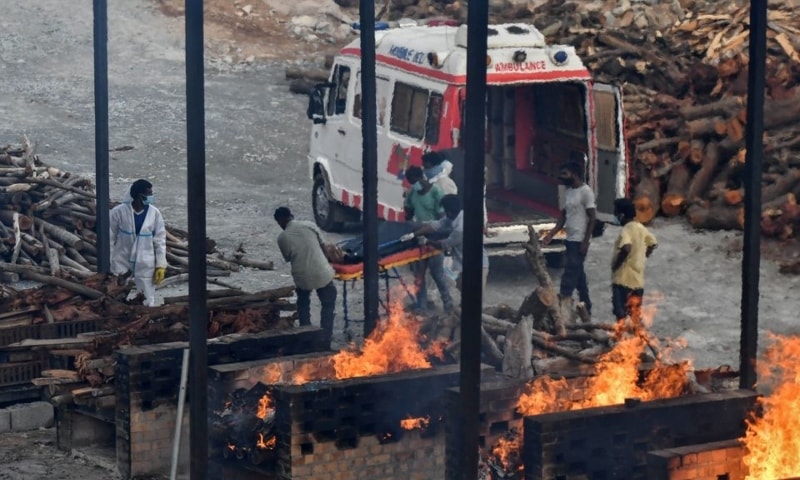Prime Minister Narendra Modi sounded the alarm over the rapid spread of the coronavirus through India’s vast countryside on Friday as the official tally of infections crossed 24 million, and 4,000 people died for the third straight day.
The highly transmissible B.1.617 variant of the coronavirus first detected in India is also spreading across the globe, and Modi said his government was “on a war footing” in its fight against the contagion.
“The outbreak is reaching rural areas with great speed,” Modi said, addressing a group of farmers in a virtual conference. “I want to once again warn all farmers and all those who live in villages about corona.”
Although about two-thirds of Indians live in rural towns and villages where healthcare facilities are meagre, it was the first time Modi has specifically referred to the spread of the virus in the countryside since a second wave of the epidemic erupted in February.
Indian health ministry data showed 4,000 deaths and 343,144 infections over the last 24 hours. It was the third consecutive day of 4,000 deaths, or more, but daily infections have kept below last week’s peak of 414,188.
The tally of infections since the pandemic first struck India more than a year ago crossed 24 million, and the death toll stood at 262,317.
But experts say a lack of testing in many places, particularly rural areas, meant the official count grossly underestimates the true scale of the crisis.
Television has broadcast images of families weeping over the dead in rural hospitals or camping in wards to tend the sick.
Bodies have washed up in the Ganges, the river that flows through the country’s most populous states, as crematoriums are overwhelmed and wood for funeral pyres is in short supply.
“We are removing all obstacles that are in the way of any resources we need in this fight,” Modi said. “Work is being done on a war footing. All departments of the government, all resources, our armed forces, our scientists, everyone is working day and night to counter Covid, together.”
Modi has faced severe criticism over his leadership during the health crisis, having allowed a huge Hindu gathering to take place in northern India in February and addressing political rallies in April that have been blamed for fuelling the spread of the disease to rural areas.
Infectious variant
The Indian B.1.617 variant has been found in eight nations in the Americas, including Canada and the United States, said Jairo Mendez, an infectious diseases expert with the World Health Organisation (WHO).
“These variants have a greater capacity for transmission, but so far we have not found any collateral consequences,” Mendez said. “The only worry is that they spread faster.”
Among the infected were travellers in Panama and Argentina who had arrived from India or Europe, while in the Caribbean, the variant was found in Aruba, Dutch St Maarten and the French department of Guadeloupe.
It has spread to the Himalayan nation of Nepal and also been detected in Britain and Singapore.
Public Health England said the total number of infections due to the variant had more than doubled in the past week, to 1,313 across Britain.
“We are anxious about it — it has been spreading,” Prime Minister Boris Johnson said, adding that meetings would be held to discuss measures. “We’re ruling nothing out.”
Singapore said it was limiting social gatherings to two people and putting a halt to dining in restaurants.
About half of the nearly 150 passengers booked to return on Australia’s first repatriation flight from India were denied boarding because of positive test results, an Australian government official said.
‘Frightening speed’
“The human catastrophe that is unfolding in India and Nepal should be a warning to other countries in the region to invest heavily in surge capacity for an emergency response,” said Yamini Mishra, of rights group Amnesty International.
“The virus is spreading and transcending borders at a frightening speed and will continue to hit the region’s most marginalised populations hardest of all,” the group’s Asia-Pacific director said in a statement.
Although Modi threw open inoculations for all adults from May 1, vaccinations have slowed down.
India is the world’s largest vaccine producer but the huge demand has left it low on stocks. As of Friday, it had fully vaccinated just over 39.4m people, or over 2.9 per cent of a population of about 1.35 billion, government data shows.
More than 2bn doses of vaccine are likely to be available between August to December this year, top government adviser VK Paul told reporters amid criticism that the government had mishandled the vaccine plan.
Those would include 750m doses of AstraZeneca’s vaccine, as well as 550m of Covaxin, made by domestic producer Bharat Biotech.
Dr Reddy’s Laboratories Ltd said the first batch of the Sputnik V vaccine imported from Russia that landed in India on May 1 received regulatory clearance on Thursday and the first dose of the shot was administered in Hyderabad on Friday as part of a limited pilot.
